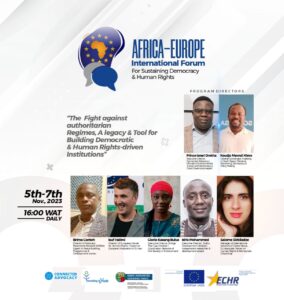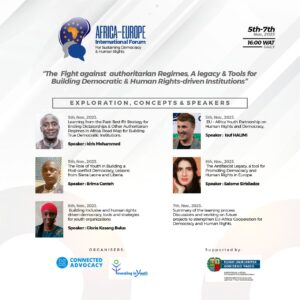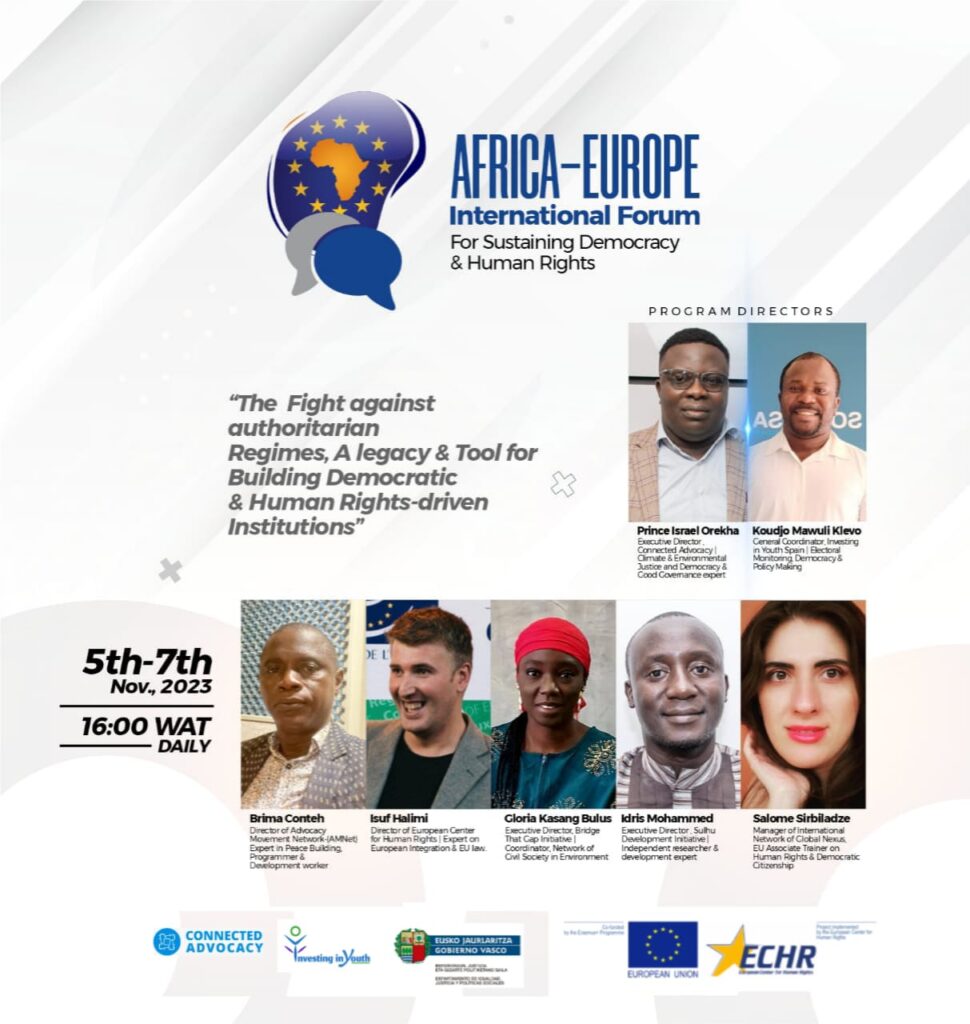THE AFRICA –EUROPEAN INTERNATIONAL FORUM FOR SUSTAINING DEMOCRACY & HUMAN RIGHT THE ROLE OF YOUTH IN AFRICA’S DEMOCRATIC EXPERIENCE IN PROMOTING ENVIRONMENTAL GOVERNANCE AND SOCIAL JUSTICE (THE FIGHT AGAINST AUTHORITARIAN REGIMES, A LEGACY & TOOL FOR BUILDING DEMOCRATIC & HUMAN RIGHT -DRIVEN INSTITUTIONS HELD FROM THE 5TH – 7TH OF NOVEMBER, 2023.
Introduction:

In furtherance of the dialogue on sustaining democracy in Africa. The Africa–European International Forum held a three-day workshop with the primary objective of amplifying the role of young people in deepening the culture of democracy in Africa. The forum leveraged the expertise of various facilitators namely, Idris Mohammed, Executive Director, Sulhu Development Initiative, Isuf Halimi, Director of European Centre for Human Rights, Salome Sirbiladze, Manager of International Network of Global Nexus and Gloria Bulus, Executive Director Bridge That Gap Initiative to sensitize and build the advocacy capacity of participants across the globe. The workshop was co-coordinated by Prince Isreal Orekha, the Executive Director of Connected Advocacy, and Koudjo Mawuli Kievo , the General Coordinator of Investing in Youth Spain. Idris Mohammed took participants through the different epochs and strategies for organizing social movements and was very emphatic about having a truly independent electoral body in Africa that is insulated from political interference, otherwise, it would be extremely impossible to sustain democracy in Africa.
Salome narrated her journey of becoming educated through challenging phases and emphasized the importance of education – formal or informal- to develop skills and knowledge for advocacy. This is so because young people in Africa and around the world need to be educated to appreciate and understand the social phenomena and other complexities around them and be able to interrogate or advocate for social change in a non-violent way. And, this could happen through coaching or mentorship, identifying a mentor in the civic or political space is key to meaningful advocacy engagement because young activists must engage from the standpoint of enlightened self-interest. Salome also noted the significance of establishing young people-led and oriented civil society organizations for inclusive governance as a prerequisite for effective youth involvement and participation in governance, including monitoring and evaluating the dividends of democracy in Africa.
Nevertheless, Salome highlighted the vulnerabilities of young people and how they could become a willing tool for destabilization and extremism in Africa and other parts of the world. However, Salome encouraged participant to avail themselves of the ubiquitous resources online in building their advocacy skills for greater impact. In addition, Isurf Halimi, stressed the need for networking both locally and internationally for effective and sustained advocacy around social change and democracy either in Africa or Europe. Halimi suggested that the culture of democracy can only be sustained when activists and other social actors work on a shared vision and make their resources available to one another in the struggle for democratic values in Africa and Europe and show interest in collaborative efforts to drive the initiative.
Furthermore, Gloria Bulus, stated and reinforced the imperatives of networks to strengthen collective impact mechanisms for social change, including strategies such as raising awareness, media engagements, promoting a culture of peace and non-violence, evidence-based advocacy, constructive criticism and value addition in building partnerships and collaborative efforts. The need to also monitor and evaluate governance deliverables as a means of measuring the dividends of democracy. For instance, Gloria made reference to the Not–Too–Young–To–Run legislative advocacy, which culminated in a bill that was signed into an Act in 2018. This piece of legislation provided more opportunities for young people in Nigeria to engage in elective positions across boards by lowering the age criterion for holding public office. As it is, this legislation has increased the interest and number of young people involved and participating in governance as there was a significant increase in the number or percentage of young people offering themselves for elective positions in Nigeria, after the bill was passed and assented into law in 2018. Gloria, clearly asserted that “when we build inclusive democracy, we create a culture and platforms for dialogue”.
Conclusion:
In conclusion, the speakers emphasized the importance of youth participation and leadership in promoting democracy and social change. They also acknowledged the challenges and risks that young people face in their quest for democratic values and social justice. They urged the participants to leverage the online resources, platforms, and opportunities to enhance their knowledge, skills, and capacities for positive change. They also encouraged them to be resilient, proactive, and constructive in their engagement with various stakeholders and institutions.
The workshop concluded with a call to action for young people in Africa to take up the mantle of leadership and civic engagement in their respective countries and communities. The forum also created a platform for networking and collaboration among the participants, who came from diverse backgrounds and regions. The forum hopes to continue the dialogue and support the initiatives of young people in Africa who are committed to sustaining democracy in the continent.
Recommendations:
The forum expressed a strong preference for an in-person event that would take place in Nigeria or another suitable location, considering the accessibility of resources. The forum emphasized the importance of face-to-face interaction and collaboration for the success of the event and the achievement of its objectives.
Resolutions:
- There is a need to promote electoral reforms that will ensure the independence and competence of the electoral bodies, as well as the transparency and credibility of the electoral processes.
- Identify and engage with national, regional, and global institutions to advocate for our cause and to seek their support and solidarity
- Convene an African citizens’ summit, either in Africa or Europe, to bring together diverse voices and perspectives from civil society, media, academia, and other stakeholders.
- Mobilize grassroots activists and community-based organizations to amplify our message and to create positive change at the local level.
- Organize a multi-stakeholder round table, involving development partners and global democratic institutions, to foster dialogue and collaboration on common challenges and opportunities
- Organize a capacity-building workshop on advocacy, to equip young people and organizations with the skills and tools to effectively influence policies and decisions that affect them.
